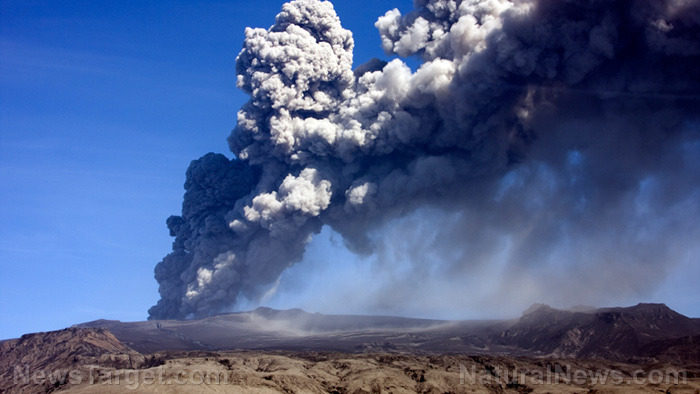Red tide kills tons of fishes in Florida
07/16/2021 / By Ramon Tomey

Tens of thousands of dead fishes turned up off the coast of St. Petersburg in Florida on the morning of July 9. The city had been collecting the dead fishes for the past several days, with nine tons being cleaned up in a single day.
Red tide reportedly caused the death of the fishes, and city officials said the arrival of Tropical Storm Elsa worsened the situation.
The fish cleanup commenced after a wave of dead fish arrived near the coast days ago. St. Petersburg Emergency Manager Amber Boulding said: “We’ve collected 15 tons of fish in those last 10 days, and nine tons of those fish have been picked up in the last 24 hours.” City officials noted that 15 tons amounted to 25,000 fish while nine tons was about 15,000 fish.
Boulding added that the problem is widespread and the work is tedious. The effort has forced the city to recruit more than 120 staff members from other departments aside from public works to help out. Officials have also considered bringing in outside contractors to help.
The cleanup efforts came with a price. Other non-essential services such as mowing, tree trimming and pothole repairs had been delayed as multiple city workers were pulled away from their day jobs.
“We’re out there, we’re scraping and netting fish – but the best way to let us know where those kills are, and where the big piles of fish are, is to let us know,” Boulding said.
Most have assumed red tide blooms caused by high concentration of Karenia brevis were behind the fish deaths – with Elsa making them worse. (Related: It’s a simple chain of cause-and-effect: Toxic green algae in Florida is the result of man-made pollution.)
While red tide counts were high in the waters of St. Petersburg, additional testing from the Florida Fish and Wildlife Conservation Commission (FWC) is needed to determine Elsa’s impact on the outbreak.
FWC research scientist Kate Hubbard said the current red tide outbreak stood out from earlier ones. “It’s unusual to have the levels we’re seeing, and to have them this time of year,” she said. Hubbard added that her department in the FWC is ramping up water testing and investigating fish kills to respond to the severe red tide blooms.
Residents are complaining about the dead fish and the putrid smell
Red tide blooms have appeared in both Boca Ciego and Tampa bays. These have posed a concern for people living near the area and those seeking to enjoy the waterfront at St. Petersburg. Some who spoke to the Tampa Bay Times lamented the dead fish and the resulting smell.
Nick Finch planned to celebrate Fourth of July and his son’s birthday by the beach at Lassing Park. However, the appearance of dead fish killed by red tide derailed his plans. The 27-year-old father did his best to endure the odor when he visited the park with his son on July 1. “I’m not sure how long we’ll be outside with that smell,” Finch said.
The smell at Lassing Park also made Noel Jambor and his pet terrier return to their car. He said he usually sees people kiteboarding in the water, but not at that moment. “No one’s going to come here right now. It stinks,” Jambor said.
Meanwhile, Mary Jo Allen described the fish kills that reached the Coquina Key neighborhood where she lived. Thousands of dead fish filled a canal there after the tropical storm passed by Pinellas County on July 7. She told Bay News 9: “It’s almost like you can walk across the water on the fish. That’s what it feels like, and that’s what we saw first thing … when we woke up from the storm.
Allen said that she and other residents of the Waterside South apartment complex had been dealing with fish kills for the past two weeks. However, she added that things worsened after Elsa hit their area – as the combination of red tide toxins in the air and the scent of rotting fish became too much. (Related: Florida battling dual ecological disasters … What aren’t they telling residents about the connection between the toxic green algae and red tides?)
“You can’t be outside. Some people have left … [and] gone to hotels. You get a headache … [and] some coughing. [You] have to hold your nose if you’re going to walk by with your dog,” she said. Allen added that complaints about the dead fishes had been filed to St. Petersburg Mayor Rick Kriseman. “We haven’t gotten any response,” she said.
Kriseman’s spokesperson, Ben Kirby, denied allegations that the complaints fell on deaf ears. “As a point of reference, our staff had been collecting dead fish for nine straight days in a row – including over the [Fourth of July] holiday weekend,” he said.
Environ.news has more articles about fish kills in Florida caused by red tide.
Sources include:
Tagged Under: cleanup operation, dead fish, fish kills, fish populations, Florida, Karenia brevis, red tide, red tide blooms, St. Petersburg, Tropical Storm Elsa
RECENT NEWS & ARTICLES
COPYRIGHT © 2017 ENVIRON NEWS





















